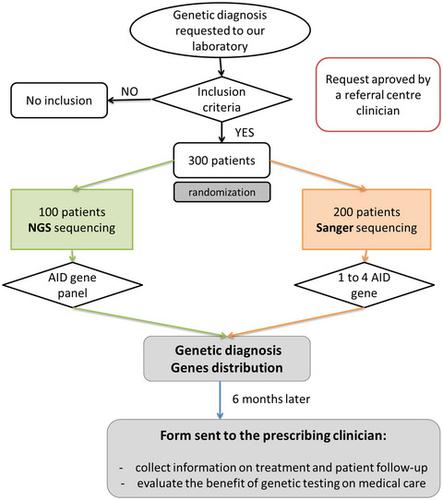当前位置:
X-MOL 学术
›
Clin. Exp. Immunol.
›
论文详情
Our official English website, www.x-mol.net, welcomes your
feedback! (Note: you will need to create a separate account there.)
Is gene panel more efficient than clinical based gene sequencing to diagnose autoinflammatory diseases? A randomized study.
Clinical & Experimental Immunology ( IF 3.4 ) Pub Date : 2020-09-09 , DOI: 10.1111/cei.13511 M Rama 1 , T Mura 2 , I Kone-Paut 3 , G Boursier 1 , S Aouinti 3 , I Touitou 1, 4 , G Sarrabay 1, 4
Clinical & Experimental Immunology ( IF 3.4 ) Pub Date : 2020-09-09 , DOI: 10.1111/cei.13511 M Rama 1 , T Mura 2 , I Kone-Paut 3 , G Boursier 1 , S Aouinti 3 , I Touitou 1, 4 , G Sarrabay 1, 4
Affiliation

|
The aim of this study was to compare the effectiveness of the gene‐panel next‐generation sequencing (NGS) strategy versus the clinical‐based gene Sanger sequencing for the genetic diagnosis of autoinflammatory diseases (AIDs). Secondary goals were to describe the gene and mutation distribution in AID patients and to evaluate the impact of the genetic report on the patient’s medical care and treatment. Patients with AID symptoms were enrolled prospectively and randomized to two arms, NGS (n = 99) (32–55 genes) and Sanger sequencing (n = 197) (one to four genes). Genotypes were classified as ‘consistent/confirmatory’, ‘uncertain significance’ or ‘non‐contributory’. The proportion of patients with pathogenic genotypes concordant with the AID phenotype (consistent/confirmatory) was significantly higher with NGS than Sanger sequencing [10 of 99 (10·1%) versus eight of 197 (4·1%)]. MEFV, ADA2 and MVK were the most represented genes with a consistent/confirmed genotype, whereas MEFV, NLRP3, NOD2 and TNFRSF1A were found in the ‘uncertain significance’ genotypes. Six months after the genetic report was sent, 54 of 128 (42·2%) patients had received effective treatment for their symptoms; 13 of 128 (10·2%) had started treatment after the genetic study. For 59 of 128 (46%) patients, the results had an impact on their overall care, independent of sequencing group and diagnostic conclusion. Targeted NGS improved the diagnosis and global care of patients with AIDs.
中文翻译:

基因面板是否比基于临床的基因测序更有效地诊断自身炎症性疾病?一项随机研究。
本研究的目的是比较基因组二代测序 (NGS) 策略与基于临床的基因 Sanger 测序在自身炎症性疾病 (AID) 基因诊断中的有效性。次要目标是描述 AID 患者的基因和突变分布,并评估基因报告对患者医疗护理和治疗的影响。具有 AID 症状的患者被前瞻性纳入并随机分为两组,NGS(n = 99)(32-55 个基因)和 Sanger 测序(n = 197)(一到四个基因)。基因型被分类为“一致/确证”、“意义不明”或“无贡献”。与 Sanger 测序相比,NGS 中致病基因型与 AID 表型一致(一致/确证)的患者比例显着更高 [99 人中有 10 人 (10·1%),197 人中有 8 人 (4·1%)]。MEFV、ADA2和MVK是最具代表性的基因,具有一致/确认的基因型,而MEFV、NLRP3、NOD2和TNFRSF1A在“意义不明”的基因型中发现。遗传报告发出六个月后,128 名患者中有 54 名 (42·2%) 的症状得到了有效治疗;128 人中有 13 人 (10·2%) 在基因研究后开始治疗。对于 128 名患者中的 59 名 (46%),结果对他们的整体护理产生影响,与测序组和诊断结论无关。靶向 NGS 改善了艾滋病患者的诊断和全球护理。
更新日期:2020-09-09
中文翻译:

基因面板是否比基于临床的基因测序更有效地诊断自身炎症性疾病?一项随机研究。
本研究的目的是比较基因组二代测序 (NGS) 策略与基于临床的基因 Sanger 测序在自身炎症性疾病 (AID) 基因诊断中的有效性。次要目标是描述 AID 患者的基因和突变分布,并评估基因报告对患者医疗护理和治疗的影响。具有 AID 症状的患者被前瞻性纳入并随机分为两组,NGS(n = 99)(32-55 个基因)和 Sanger 测序(n = 197)(一到四个基因)。基因型被分类为“一致/确证”、“意义不明”或“无贡献”。与 Sanger 测序相比,NGS 中致病基因型与 AID 表型一致(一致/确证)的患者比例显着更高 [99 人中有 10 人 (10·1%),197 人中有 8 人 (4·1%)]。MEFV、ADA2和MVK是最具代表性的基因,具有一致/确认的基因型,而MEFV、NLRP3、NOD2和TNFRSF1A在“意义不明”的基因型中发现。遗传报告发出六个月后,128 名患者中有 54 名 (42·2%) 的症状得到了有效治疗;128 人中有 13 人 (10·2%) 在基因研究后开始治疗。对于 128 名患者中的 59 名 (46%),结果对他们的整体护理产生影响,与测序组和诊断结论无关。靶向 NGS 改善了艾滋病患者的诊断和全球护理。











































 京公网安备 11010802027423号
京公网安备 11010802027423号